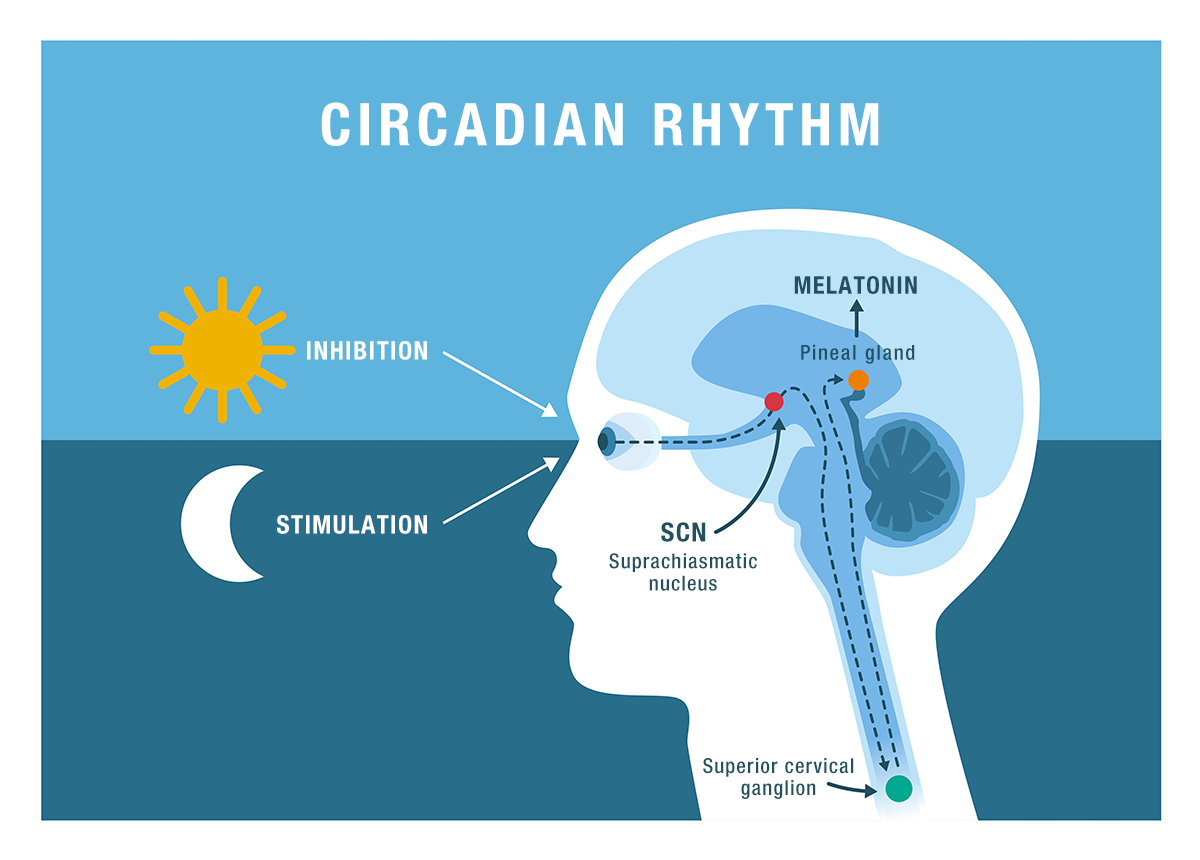Cardiovascular Health: Identifying Risks, Preventing Disease, and Personalizing Care
Cardiovascular diseases (CVDs) remain one of the leading causes of…
Continue reading


Sleep is a natural health process that involves complex physiological mechanisms where the senses are largely ignored and motor function is primarily inhibited. Many factors regulate sleep propensity, including neuronal, hormonal, genetic, and neurotransmitter factors. Among these, an important part of this process is the presence of the hormone melatonin, whose dysregulation is one of the main causes behind sleep disorders and circadian rhythm disruption (1).
The duration and quality of sleep are essential for well-being, helping with memory consolidation and brain function restoration. When disrupted, it can lead to or exacerbate diseases (2).
The recommended duration of sleep can vary depending on age. According to the Brazilian Sleep Society, newborns should sleep an average of 14-18 hours per day; during childhood, children should sleep between 9-11 hours; adolescents need 8-10 hours of sleep, while adults should get an average of 7-8 hours of sleep per night (3).
Now, let’s explore more about what melatonin is and its function in the human body.
Melatonin, known as the sleep hormone, is involved in various physiological processes and plays an important role in synchronizing the circadian rhythm (known as the biological clock).
It is synthesized from serotonin (a neurotransmitter) by an endocrine gland called the pineal gland, which is located in the brain, approximately in the center of the brain. However, it is also synthesized in other parts of the body, such as the retina, bone marrow, liver, intestines, skin, and immune system (4-5).
Melatonin is related to the presence or absence of light, and this directly influences the body’s biological cycle. But do you know how melatonin actually works in the body?
The synthesis of melatonin occurs in response to the presence or absence of light, promoting the onset of sleep and regulating the circadian rhythm.
The production time of melatonin is influenced by retinal perception of light due to its inhibitory action on the pineal gland. Therefore, its concentration peaks during the night as the light fades and declines in the morning, causing wakefulness.
After being synthesized, melatonin is immediately released into the bloodstream, diffusing throughout the body and not being stored (6).
The function of melatonin is related to the regulation of the circadian rhythm, which is a biological cycle that regulates daily activities of the body, such as temperature, feeding, motor activity, and sleep.
Its origin is endogenous, and it has synchronization mechanisms with environmental cycles. Its main synchronizer is the light-dark cycle, but there are other minor synchronizers, such as meal times, regular exercise, sleep schedules, and regular social contacts (4,6).

In addition to its role as a chronobiotic agent, it is directly involved in cellular protection and has antioxidant, anti-inflammatory, immunostimulant properties, and the ability to eliminate free radicals.
The antioxidant effect leads to the neutralization of potentially harmful oxygen and nitrogen free radicals in cells. It can also interfere with bone resorption, inhibiting the activity of osteoclasts and the formation of reactive substances, increasing the activity of superoxide dismutase (5-6).
As a stimulator, it acts by antagonizing the immunosuppressive effects of cortisol and stimulating lymphocyte activity. The active synthesis of melatonin also regulates the production of interleukin-2, an essential protein for immune function (4).
Insomnia is a clinical condition that can be classified as difficulty in falling asleep, difficulty in maintaining sleep, early awakening, and non-restorative sleep. It is considered one of the most common sleep disorders, being one of the main complaints of patients seeking medical care (7).
Sleep disorders often result in negative repercussions and are associated with excessive fatigue, cognitive deficits, anxiety, stress, illnesses, or changes in habits, potentially becoming chronic. They are also correlated with other pathologies, such as obesity, mental disorders, hypertension, and diabetes (8).
Its relationship with melatonin is due to the regulation of the sleep-wake cycle and circadian rhythm by the interaction between the homeostatic process and the circadian process.
The circadian process increases throughout the day until two to three hours before sleeping and serves to suppress the homeostatic process, which is the system’s ability to self-regulate, maintaining internal conditions regardless of external environmental conditions.
At the onset of sleep, there is a decrease in the alert signal caused by the increased level of melatonin in the plasma. This reduction in the alert signal allows the homeostatic process to advance, working to regulate both rhythms, also leading to sleep regulation (9).

Melatonin levels in the bloodstream change throughout life. After birth, the circadian cycle undergoes a progressive maturation that is fully achieved by 3 months of age (10).
In response to this, its synthesis begins on average at 3-4 months, gradually increasing during childhood, peaking between 8-10 years, and then declining drastically during puberty.
After 40-45 years of age, melatonin levels begin to progressively decrease due to the decrease in adrenergic innervation, as well as the decrease in the number of beta-adrenergic receptors, resulting in a reduced functioning capacity of the pineal gland.
The use of beta-adrenergic blocking medications can also interfere with melatonin levels by preventing noradrenaline from binding to the pineal gland, limiting hormone synthesis (5).
The concentration of melatonin in healthy individuals is very low for most of the day, but it significantly increases at dusk, when its levels reach their peak (acrophase) (5,6).
Among the main habits to improve melatonin production are:
Some habits can decrease or impair melatonin production and, consequently, worsen the quality of your sleep. For example:
According to ANVISA (Brazil’s Health Regulatory Agency), exogenous melatonin is not a substance that induces sleep, but rather a sleep signaler, meaning it assists in sleep induction; however, it is not used as a treatment for insomnia.
The use of exogenous melatonin for the treatment of insomnia is indicated by specialists in cases of delayed sleep phase, jet lag effect, and rapid eye movement (REM) sleep behavioral disorder, characterized by the “dream phase,” where sleep paralysis and nightmare disturbances occur.
In these cases, melatonin administration aims to try to regulate the patient’s drowsiness period. Although temporary, melatonin can help reset the biological clock and improve symptoms such as daytime sleepiness and fatigue, but it is important to remember that it does not maintain sleep, it only helps initiate it, and the indication should be made by the doctor, within the patient’s clinical context (11).
Some benefits of melatonin are related to (12):
SYNLAB offers the Sleep Disturbance – Melatonin Biorhythm test. It involves determining melatonin levels in saliva at different times of the night (10 PM, 2 AM, 4 AM, 8 AM), allowing for the evaluation of the patient’s melatonin circadian rhythm profile at the main peak times of melatonin, relating them to the wake/sleep circadian rhythm, and thus detecting any deviation from the normal pattern, both in timing and intensity.
The test is performed using the Radioimmunoassay technique, which involves the reaction between the radioactive and non-radioactive antigen by a fixed number at the binding sites of antibodies.
Accurate and up-to-date testing is essential for more precise diagnoses and better treatment guidance. And SYNLAB is here to help.
SYNLAB offers diagnostic solutions with rigorous quality control to companies, patients, and doctors. With over 10 years in Brazil, SYNLAB operates in 36 countries and across three continents, leading in service provision in Europe.
Contact the SYNLAB team to learn about the available tests.
(1) Vasey C, McBride J, Penta K. Circadian Rhythm Dysregulation and Restoration: The Role of Melatonin. Nutrients. 2021 Sep 30;13(10):3480. doi: 10.3390/nu13103480. PMID: 34684482; PMCID: PMC8538349.
(2) Chitimus DM, Popescu MR, Voiculescu SE, Panaitescu AM, Pavel B, Zagrean L, Zagrean A-M. Melatonin’s Impact on Antioxidative and Anti-Inflammatory Reprogramming in Homeostasis and Disease. Biomolecules. 2020; 10(9):1211.
(3) Associação Brasileira do Sono. Revisores e escritores. Semana do sono; São Paulo, SP, Brasil: 2020.
(4) Neurochirurgie. 2015 Apr-Jun;61(2-3):77-84. doi: 10.1016/j.neuchi.2015.03.002. Epub 2015 Apr 20. PMID: 25908646.
(5) Poza JJ, Pujol M, Ortega-Albás JJ, Romero O; en representación del Grupo de estudio de insomnio de la Sociedad Española de Sueño (SES). Melatonin in sleep disorders. Neurologia (Engl Ed). 2018 Nov 19:S0213-4853(18)30200-7.
(6) Esposito S, Laino D, D’Alonzo R, Mencarelli A, Di Genova L, Fattorusso A, Argentiero A, Mencaroni E. Pediatric sleep disturbances and treatment with melatonin. J Transl Med. 2019 Mar 12;17(1):77. doi: 10.1186/s12967-019-1835-1. PMID: 30871585; PMCID: PMC6419450.
(7) Fahey CD, Zee PC. Circadian rhythm sleep disorders and phototherapy. Psychiatr Clin North Am. 2006 Dec;29(4):989-1007; abstract ix. doi: 10.1016/j.psc.2006.09.009. PMID: 17118278.
(8) CARONE, Caroline Maria de Mello et al. Fatores associados a distúrbios do sono em estudantes universitários. Cadernos de Saúde Pública, v. 36, p. e00074919, 2020.
(9) BOTAS, Filipe Manuel Carvalho. O papel da melatonina. 2014. Tese de Doutorado.
(10) KASECKER, Fernanda Gugelmin; NUNES, Carlos Pereira. Melatonina e glândula pineal. Revista da Faculdade de Medicina de Teresópolis, v. 1, n. 01, 2017.
(11) BRASIL. Ministério da Saúde. Agência Nacional de Vigilância Sanitária (ANVISA). DE ALIMENTOS, Gerência-Geral. Análise de informações sobre segurança e eficácia da melatonina. Diário Oficial da União, Poder Executivo, Brasília, DF, 2020.
(12) https://www.endocrino.org.br/media/uploads/PDFs/posicionamento_sobre_melatonina_sbem.pdf
Find out about the exam
Cardiovascular diseases (CVDs) remain one of the leading causes of…
Continue reading
Serotonin, popularly known as the “happiness hormone,” is a fundamental…
Continue reading
Have you ever felt discomfort after eating certain foods, such…
Continue reading